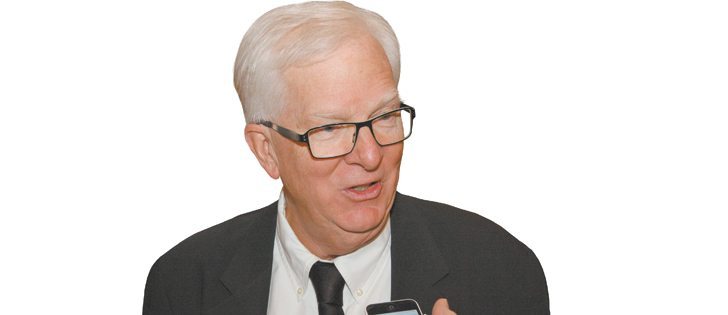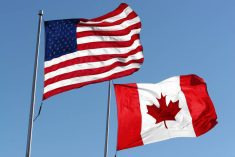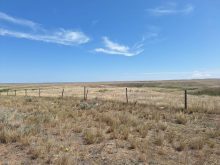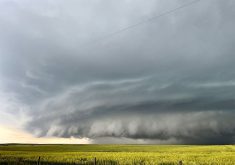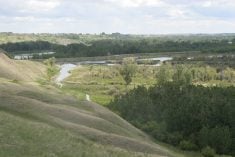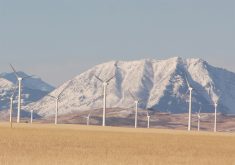David Phillips wanted to be a teacher or geographer but instead became as big a superstar as any weatherman could hope to become.
“We’re not supposed to be famous. We’re supposed to be backroom people,” Phillips said as he tried to make sense of his path to nationwide recognition.
“I just became, in a way, the go-to guy. Not that I encouraged it, but I was always available.”
Phillips is a fixture on radio and television stations with his popular annual list of Canada’s top weather stories and his willingness to discuss and describe complex weather phenomena in a clear and interesting way.
Read Also

Farming Smarter receives financial boost from Alberta government for potato research
Farming Smarter near Lethbridge got a boost to its research equipment, thanks to the Alberta government’s increase in funding for research associations.
He’s not a meteorologist. He is described by Environment Canada as a “senior climatologist,” and he’s happy with that description.
However, when he was in university in his hometown of Windsor, Ont., Phillips didn’t picture himself as a climatologist. He was a geography student and had a favorite professor who was a climatologist.
The professor suggested he apply for a meteorology job with the government. At the interview, Phillips pointed out he wasn’t a physics and math major, the usual prerequisites for that sort of job.
Three months later he got a job offer from Environment Canada to move to Toronto and study how the Great Lakes affect weather.
“That was 48 years ago,” he said, noting the only other job he’s had was room service waiter at the Banff Springs Hotel while he was a student.
Phillips first did research and analysis, but he found that he liked speaking at conferences, where he could explain the relevance of research to other experts.
The government’s Treasury Board then asked him to revise a bonus pay system that rewarded federal employees who worked in particularly challenging environments.
Phillips combined 18 weather factors with other criteria, such as isolation, to come up with a ranking of tough-to-live-in locations and gave it to his superiors.
A reporter found out about the “weather severity index” and did a story about it.
Then it exploded.
“It received front page headlines across the country. It was the perfect story,” said Phillips.
Rival cities, such as Edmonton and Calgary or Regina and Saskatoon, had fun comparing themselves and noting anything worse about the other city.
Heavyweight Newfoundland politician John Crosbie condemned Phillips’ finding that St. John’s had unusually harsh weather.
“The media just ate it up,” said Phillips, who admitted he was befuddled at the time.
“I had to go on Canada AM and Cross Country Checkup and defend the study.”
After getting roasted by a few people with sensitive feelings about their communities’ weather, Phillips found that he loved teaching the complexities of the weather to Canadians.
“I kind of liked the idea of explaining something to people in a way that my neighbours could understand it, or my children could understand it, not to a scientific audience but to people who it really matters to,” said Phillips.
So he kept talking to the media and the public about weather stories and became the “go-to guy” within his department when reporters called.
He also began developing fun projects, like his Weather Trivia Calendar, which was given to the volunteers who supply Environment Canada with weather observations.
“It took off,” he said of the calendar.
At the time, it was not distributed to the general public.
“It became almost a black market around the media.”
He also started producing a Top 10 list of weather stories, which also drew nationwide attention and interest.
Phillips admitted wondering whether his willingness to come up with “fun” projects for the public would diminish his professional reputation. He once wondered if it would bother him if “inventor of the Weather Trivia Calendar” was carved on his gravestone.
“I’m not embarrassed by that. I think that if I can reach people and turn them on to weather and get them fascinated by that, (I’m happy).”
Phillips said he could have retired 15 years ago but keeps going because he loves teaching Canadians about their weather. People seem to have an insatiable appetite for weather talk, so he never struggles to find something to discuss.
That doesn’t extend to his own home. His wife and daughter have told him over the years that they don’t want to talk much about the weather at home.
So, unlike most Canadian households, the Phillips home hasn’t been filled with talk about the weather.
He leaves that for the office.




